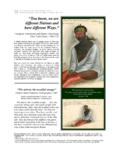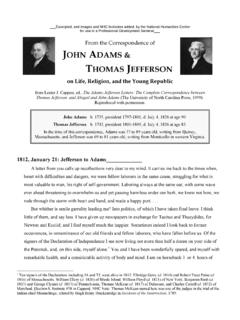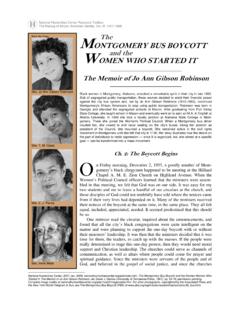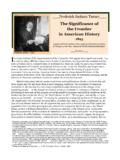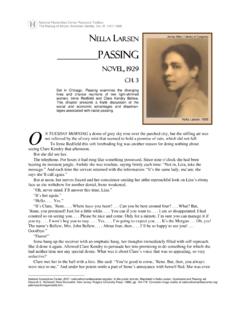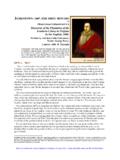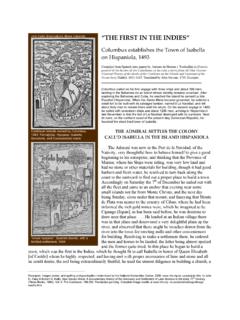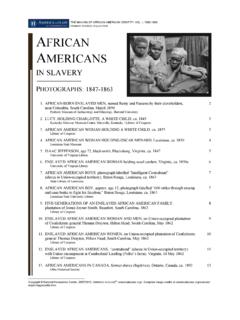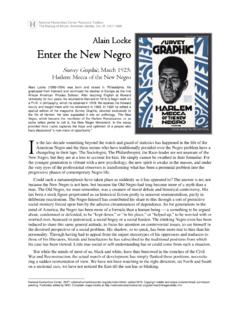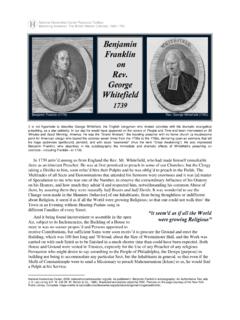Transcription of RICHARD HAKLUYT 1584 - National Humanities Center
1 _____RICHARD HAKLUYT___1584_____ A particular discourse concerning the great necessity and manifold commodities that are like to grow to this Realm of England by the Western discoveries lately attempted, Written in the year 1584 * known as DISCOURSE OF WESTERN PLANTING [Excerpts] 1. this western discovery will be greatly for the enlargement of the gospel of Christ whereunto the princes of the reformed religion are chiefly bound among whom her Majesty is principal. * Excerpted, spelling and some wording modernized, and images & footnotes added by the National Humanities Center , 2006: Complete image credits at Original text and cited footnotes from David B. Quinn & Allison M. Quinn, eds. Discourse of Western Planting (London: HAKLUYT Society, 1993). HAKLUYT (pronounced Hak-loot) wrote the Discourse to urge English investors to support the planting of a colony in Virginia and to convince Queen Elizabeth that their efforts would enhance the social and economic welfare of the commonwealth.
2 Then it is necessary for the salvation of those poor people who have sat so long in darkness and in the shadow of death that preachers should be sent unto them: But by whom should these preachers be sent? By them no doubt who have taken upon them the protection and defense of the Christian faith: now the Kings and Queens of England have the name of defenders of the faith: By which title I think they are not only charged to maintain and patronize the faith of Christ, but also to enlarge and advance the same.. Now the means to send such as shall labor effectually in this business is by planting one or two colonies of our nation upon that firm [land], where they may remain in safety, and first learn the language of the people near adjoining (the gift of tongues being now taken away) and by little and little acquaint themselves with their manner and so with discretion and mildness distill into their purged minds the sweet and lively lines of the gospel: Otherwise for preachers to run unto them rashly without some such preparation for their safety, it were nothing else but to run to their apparent and certain destruction, as it happened to those Spanish friars that before any planting without strength and company landed in Florida, where they were miserably massacred by the Savages.
3 2. all other English trades are grown beggarly or dangerous especially in all the king of Spain his dominions, where our men are driven to fling their Bibles and prayer books into the sea, and to forswear and renounce their religion and conscience, and consequently their obedience to her majesty. We are now to consider the quality and condition of all the trades which at this day are frequented by our nation .. If any of our ships trading there [Barbary coast of north Africa] be driven upon the coast of Spain, and that proof may be made that we have been there, they make it a very sufficient cause of confiscation of ship and goods, and so they thrust our men into the Inquisition, charging them that they bring armor, munition, and forbid-den merchandise to strengthen the Infidels against these parts of Christendom.. As for all Flanders and the Low Countries, these eighteen years most cruel civil wars have so spoiled the traffic there, that there is nothing but poverty and peril, and that which is worse, there is no hope of any speedy amendment.
4 And now after long hope of gain, the Hollanders as also the men of Depe are entered into their trade by the Emperor s permission, yea whereas at the first our men paid no custom, of late years contrary to their first privilege they have been urged to pay it .. [I]t behooves us to seek some new and better trade of less danger and more security, of less damage, and of more advantage.. That That National Humanities Center 2 3. this western voyage will yield unto us all the commodities of Europe, Africa, and Asia as far as we were want to travel, and supply the wants of all our decayed trades.. The countries therefore of America whereunto we have just title as being first discovered by Sebastian Cabot at the cost of that prudent prince King Henry the Seventh from Florida northward to 67 degrees, (and not yet in any Christian prince s actual possession) being answerable in climate to Barbary, Egypt, Syria, Persia, Turkey, Greece, all the islands of the Levant sea [the Greek islands], Italy, Spain, Portugal, France, Flanders, high Almayne [north Germany], Denmark, Estland [Baltic coast], Poland, and Muscovy, may presently or within a short space afford unto us for little or nothing and with much more safety either all or a great part of the commodities which the aforesaid countries do yield us at a very dear hand and with manifold dangers.
5 4. this enterprise will be for the manifold employment of numbers of idle men, and for breeding of many sufficient and for utterance of the great quantity of the commodities of our Realm.. Truth it is that through our long peace and seldom sickness (two singular blessings of almighty God) we are grown more populous than ever heretofore: So that now there are of every art and science so many, that they can hardly live one by another: nay rather they are ready to eat up one another; yea many thousands of idle persons are within this Realm, which having no way to be set on work be either mutinous and seek alteration in the state, or at least very burdensome to the common wealth, and often fall to pilfering and thieving and other lewdness, whereby all the prisons of the land are daily pestered and stuffed full of them, where either they pitifully pine away, or else at length are miserably hanged.
6 [T]hese petty thieves might be condemned for certain years in the western part, especially in Newfound Land in sawing and felling of timber for masts of ships and deal boards, in burning of the fires and pine trees to make pitch, tar, rosin, and soap ashes, in beating and working of hemp for cordage: and in the more southern parts in setting them to work in mines of gold, silver, copper, lead, and iron .. In sum this enterprise will minister matter for all sorts and states of men to work upon: namely all several kinds of arti-ficers, husbandmen, seamen, merchants, soldiers, captains, physicians, lawyers, divines, cosmo-graphers, hydrographers, astronomers, historio-graphers, yea old folks, lame persons, women, and young children by many means which hereby shall still be ministered unto them, shall be kept from idleness, and be made able by their own honest and easy labor to find themselves without surcharging others.
7 5. this voyage will be a great bridle to the Indies of the king of Spain and a mean that we may arrest at our pleasure for the space of ten weeks or three months every year one or two hundred sails of his subjects ships at the fishing in Newfound Land.. the planting of two or three strong forts upon some good havens (whereof there is great store) between Florida and Cape Breton [Nova Scotia] would be a matter in short space of greater damage as well to his fleet as to his western Indies, for we should not only often times endan-ger his fleet in the return thereof, but also in few years put him in hazard in losing some part of Nova Hispania [New Spain] .. 6. the mischief that the Indian treasure wrought in time of Charles the late Emperor father to the Spanish king,1 is to be had in consideration of the Queen s most excellent majesty, least the continual comings of the like treasure from thence to his son, work the 1 King Charles I of Spain (reign: 1516-1556) became Emperor Charles V of the Holy Roman Empire in 1519, abdicating both reigns in 1556 to his son and brother, respectively.
8 He died in 1558. That That That That National Humanities Center 3 Library of Congress Ortelius, Novis Orbus (detail), in atlas Theatrum Orbis Terrarum, 1570. HAKLUYT s comments are based on a supplemental map published by Ortelius in 1581. unrevocable annoy of this Realm, whereof already we have had very dangerous experience.. With this great treasure did not the Emperor Charles get from the French king the kingdom of Naples, the Dukedom of Milan, and all other his dominions in Italy, Lombardy, Pyemont, and Savoy? with this treasure did he not take the Pope prisoner: and sacked the sea of Rome? With this treasure did not he take the French king prisoner and maintain all the great wars with France since the year of our Lord 1540 to the year of our Lord 1560[?] .. Charles the Emperor employed his treasure to the afflicting and oppressing of most of the greatest estates of Christendom.
9 7. special means may bring King Philip [II of Spain] from his high throne, and make him equal to the princes his neighbors, wherewithal is shown his weakness in the West Indies.. the Spaniard pierced the Indies and planted here and there very thinly and slenderly without having the Indian multitude in subjection, or in their towns and forts any number to hold any of them against the meanest force of a prince: so as in truth the Spaniard is very weak there.. If you touch him in the Indies, you touch the apple of his eye, for take away his treasure which is nervus belli [sinew (strength) of war], and which he has almost out of his West Indies, his old bands of soldiers will soon be dissolved, his purposes defeated, his power and strength diminished, his pride abated, and his tyranny utterly suppressed.
10 8. the limits of the king of Spain s dominions in the West Indies be nothing so large as is generally imagined and surmised, neither those parts which he holds be of any such forces as is falsely given out by the popish [Roman Catholic] clergy and others his suitors, to terrify the princes of the religion and to abuse and blind them.. he has no one town or fort in actual possession in all Nova Hispania to the north of the Tropic of Cancer, which stands in 23 degrees and a half, except the town of St. Helen and one or two small forts in Florida: for as it is in the map of Culiacan [west coast of Mexico] set out two years past with all diligence by Ortelius, Saint Michael [San Miguel] is the furthest town northward on the backside of America, and Panuco, and Villa Sancti Jacobi [perhaps Santiago, Nueva L on] are the most northerly colonies upon the Bay of Mexico.
